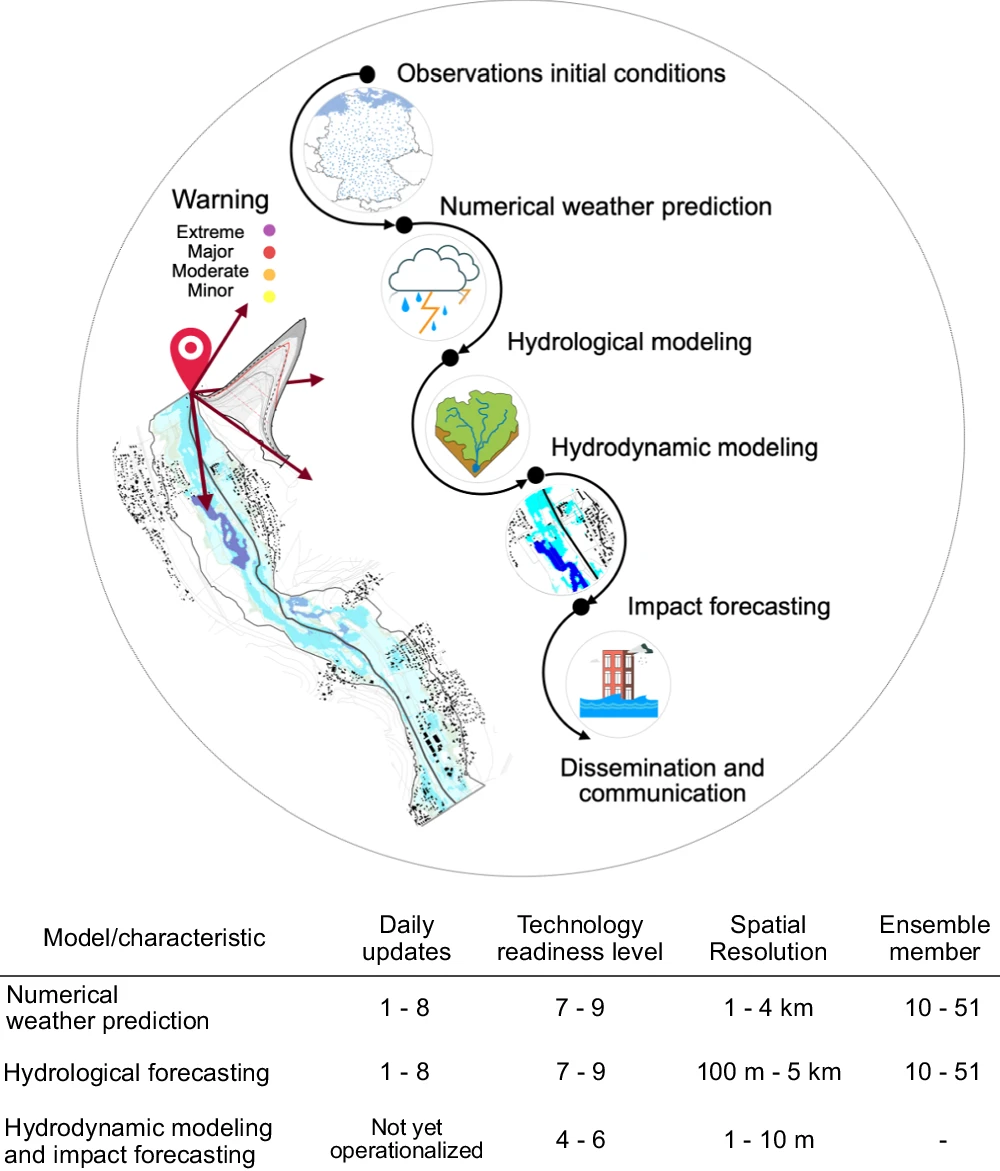Experimental Flood Forecasting System for Germany
An experimental, high-resolution flood-forecasting platform is being developed for selected catchments across Germany. The system delivers spatially and temporally detailed forecasts of high-impact heavy-precipitation events and flash floods, drawing on hydrological setups for 1 274 catchments from the CAMELS-DE data set.
For a subset of catchments, the project will add inundation mapping and impact-based flood forecasts in collaboration with the GFZ (German Research Centre for Geosciences), following the proof-of-concept demonstrated by Najafi et al., (2024) .
Short-Range Precipitation Forecasts (real-time)
Very Short-Range Precipitation Forecasts (TEST DATA)
SINFONY (Ensemble Nowcasting and NWP)
The German weather service (DWD) has established a pilot project (Seamless INtegrated FOrecastiNg sYstem - SINFONY) for the tracking and prediction of grid-based precipitation and convective cells (for up to 12 hours). The focus here is on improving forecasts for summer convective events, such as thunderstorms, which are often associated with heavy precipitation.
SINFONY is test data for which it does not guarantee any accuracy of content or constant technical availability. The German Weather Service (DWD) assumes no liability for the accuracy and completeness of the data and content or for the permanent availability of the services.
Methodology
Proof-of-Concept
A recent publication in Nature Communications demonstrated the capability of a state-of-the-art, impact-based flood early warning system with a 10-meter resolution for the Ahr flood. The system utilized DWD's ICON-D2-EPS, comprising 20 ensemble members, to predict flood inundation areas and assess the risk to buildings and infrastructure. Building on this study, we will employ an integrated forecasting system within the framework of SINFONY PILOT. This system will incorporate high-resolution, high-frequency observations into the numerical weather forecast (NWV). Consequently, the update cycle of flood forecasting can be increased from 8 to 48 forecasts per day.
 The state-of-the-art flood early warning system is extended with components of quasi-real-time hydrodynamic and impact forecasting (Figure taken from Najafi et al., (2024). High-resolution impact-based early warning system for riverine flooding. Nature Communications, https://doi.org/10.1038/s41467-024-48065-y
The state-of-the-art flood early warning system is extended with components of quasi-real-time hydrodynamic and impact forecasting (Figure taken from Najafi et al., (2024). High-resolution impact-based early warning system for riverine flooding. Nature Communications, https://doi.org/10.1038/s41467-024-48065-y
mHM
Hydrological ensemble forecasts are generated based on mesoscale hydrologic model (mHM). Basin-wise calibrations over Germany from (HI-CAM project) is used for model set-up. To generate the initial conditions of the hydrological forecast, mHM is forced with near real-time meteorological in-situ data from 1500+ stations provided by the German Weather Service (DWD). HS2S takes advantage of Multiscale Parameter Regionalization (MPR) to provide high resolution drought predictions.
UFZ Developer Team and Collaborators
The real-time flood forecasting system is under development by joint efforts of a team consisting of postdoctoral and senior researchers at CHS department of the UFZ and hydrology section of GFZ.
Service Manager and Contact Person: Husain Najafi
UFZ Team: Husain Najafi, Pallav Kumar Sherestha, Stephan Thober, Luis Samaniego, and mHM team
GFZ team: Sergiy Vorogushyn, Nithila Devi Nallasamy, Tobias Weiß
HI-CAM II Coordinator: Prof. Dr. Sabine Attinger
Terms of Use, Copyright Disclaimer and License Agreement
- All forecast maps disseminated by the UFZ team on this webpage are based on research experiments.
- The right of use and exploitation of SINFONY DATA for UFZ is limited to non-commercial research purposes.
- EVE cluster has been used for reproduction, loading, displaying, running, transferring and storing of SINFONY data
- The results obtained from the use of the SINFONY test data may only be used for scientific purposes, e.g. to accompany scientific projects at UFZ in collaboration with GFZ.
- The material on this website does not constitute legal or other professional advice.
- Copyrights are placed in the text, images, and all other contents disseminated on this webpage.
- Atmospheric forecasts are used for carrying out research purposes using real-time DWD products. They are disseminated to the UFZ under DWD License.
